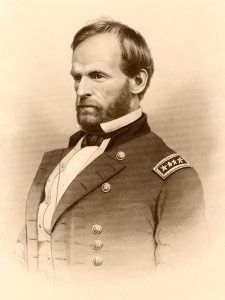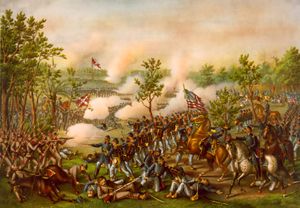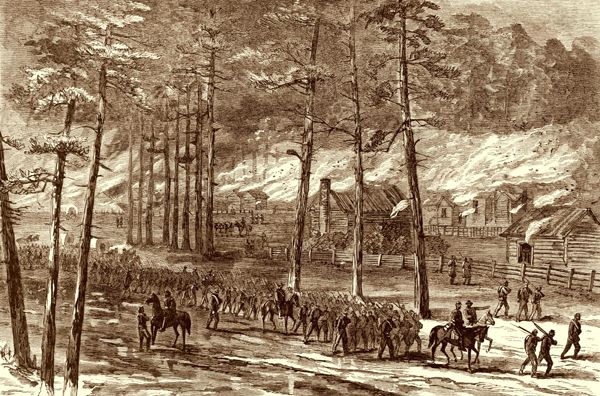William Tecumseh Sherman was a soldier, businessman, teacher, and author who served as a general in the Union Army during the Civil War and afterward led troops against the Indians in the American West.
Born Tecumseh Sherman in Lancaster, Ohio on February 8, 1820, to Judge Charles Robert Sherman and Mary Hoyt Sherman, William was one of 11 children. His father died when he was nine, and he was taken in and raised by a family friend. He joined the Military Academy at West Point at the age of 16. Upon graduation in 1840, he entered the Army as a second lieutenant and saw action in the Second Seminole War (1840-1842). Later, he would serve in the Mexican-American War (1846-1848).
In 1853, Sherman resigned from his military commission and became president of a bank in San Francisco. However, the bank failed in the financial panic of 1857. Afterward, he practiced law in Leavenworth, Kansas, a venture that was unsuccessful. In 1859, he accepted a job as the first superintendent of the Louisiana State Seminary of Learning and Military Academy, which he held until the outbreak of the Civil War. On May 14, 1861, he accepted a commission as a Colonel in the 13th U.S. Infantry regiment.
He led a brigade in the First Battle of Manassas, Virginia. In August, he was made a brigadier general of volunteers and sent to Kentucky. In October, he was put in command of the Department of the Cumberland; however, in November, he was transferred to the Department of the Missouri.
He distinguished himself as a division commander at Shiloh, Tennessee, and thus was promoted to major general in May 1862. After the occupation of Memphis, he took command of the District of Memphis from October through December 1862.
After his defeat at Chickasaw Bayou, Mississippi, he served in the capture of Arkansas Post. When General Ulysses S. Grant assumed supreme command in the West, Sherman became commander of the Army of the Tennessee. He commanded the Union left in the Chattanooga campaign before he moved to Knoxville to the relief of General Burnside.
In March 1864, when Grant became Commanding General, Sherman succeeded him as supreme commander in the West. His Atlanta campaign resulted in the fall of that city on September 2, 1864. Sherman burned through the city and, with 60,000 men, began his famous march to the sea. Savannah, Georgia, fell on December 21. In February 1865, Sherman started northward through South Carolina. In North Carolina, General Joseph E. Johnston opposed Sherman in engagements at Averasboro and Bentonville, but Johnson surrendered to Sherman after hearing of General Robert E. Lee’s surrender.
When the Civil War was over, General Ulysses S. Grant promoted Sherman first to Lieutenant General in 1866 and Commanding General of the U.S. Army in 1869 when Grant became President. Operating in the West, he deployed troops to protect transcontinental railroad workers from Indians who feared that the railroad would mean further encroachment on their territory. He also established military outposts across the region, expanding the network of federal authority.
The general who marched through Georgia during the Civil War was not the sort who would go easy on the Indians. Sherman believed Indians should be punished for their atrocities, put on reservations, and forced to stay there. He continued with his philosophy directing a series of campaigns that finally crushed Indian resistance. He perceived the devastating effects of striking at the economic basis of the Plains Indians‘ lives. By aggressively killing the buffalo and attacking Indian encampments during the winter, he weakened his enemy when their supplies and mobility were limited. By the late 1870s, the once free-roaming warrior tribes of the plains had been forced on reservations.
Sherman retired from the army on February 8, 1884, and lived most of the rest of his life in New York City. He died there on February 19, 1891, and his body was transported to St. Louis, Missouri, where he was buried in Calvary Cemetery.
© Kathy Alexander/Legends of America, updated December 2021.
Also See:
Indian War Campaigns and Battles
Sherman’s famous March to the Sea
I am tired and sick of war. Its glory is all moonshine. It is only those who have neither fired a shot nor heard the shrieks and groans of the wounded who cry aloud for blood, for vengeance, for desolation. War is hell.
— William Tecumseh Sherman




